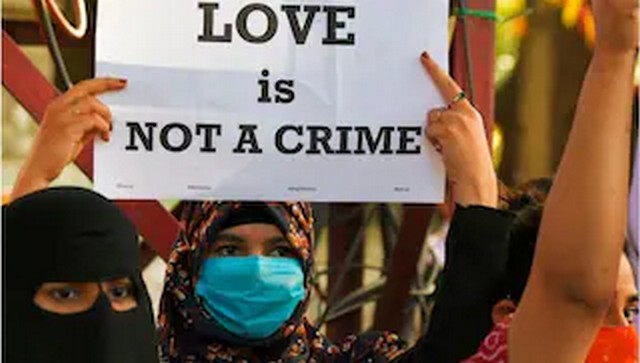The Madhya Pradesh government is headed to the Supreme Court. This comes after the Madhya Pradesh High Court passed an interim order stopping it from prosecuting interfaith couples who marry without informing the district magistrate under the MP Freedom of Religion Act (MPFRA) 2021. The high court’s direction came on a clutch of petitions challenging provisions of the MPFRA, 2021, seeking interim relief to restrain the state from prosecuting anyone under the Act. Let’s take a closer look at the matter: What does the law say? The MPFRA 2021 under Section 3 forbids conversions by misrepresentation, allurement, use of threat of force, undue influence, coercion, marriage or by any other fraudulent means.
Those found in violation are punishable with a minimum prison term of one year to a maximum of 10 years in case of mass conversion.
As per Scroll, under Section 10 of the MPFRA, an individual wishing to convert needs to give the district magistrate a 60-day notice that states that they are not doing so under any force, coercion, undue influence or allurement. A violation of this provision entails a jail term of between three and five years, and a minimum fine of Rs 50,000. The law also mandates a maximum 10-year prison term for anyone found guilty of using marriage to force someone to change their religion. The bill, approved in December 2020 by the state Cabinet in a special meeting chaired by Chief Minister Shivraj Singh Chouhan, had made Madhya Pradesh the third BJP-ruled state to pass the law after Uttar Pradesh and Uttarakhand. That bill came in the backdrop of much being made about so-called ‘love jihad’ marriages. As per New Indian Express, while the Narendra Modi-led central government told Parliament no cases of ‘Love Jihad’ were reported by any central agency, the state’s home minister said, “hum love ke khilaf nahin hain, hum jihad ke khilaf hain. (We are not against Love, but are against Jihad). What did the petitioners claim? As per Live Law, the petitioners alleged that the law imbued authorities with “unbridled and arbitrary powers” to prosecute citizens. They added that the law hinders the fundamental rights of citizens to practice any religion and marry a person of their choice regardless of caste and religion.. “A citizen is under no obligation either to disclose his own religion or his intention to switch over to another religion,” the petitioners told the court, as per the report. The petitioners further asked the court to restrain the government from prosecuting individuals under the law until the case is heard. The government, meanwhile, told the court any interim relief could amount to a final verdict on the matter. It further urged the court to uphold the constitutionality of the enactment. What did the court say? The court sided with the petitioners.
The court said that Section 10 of the law was prima facie unconstitutional, as per The Times of India.
A division bench of Justices Sujoy Paul and PC Gupta on 14 November observed that Section 10, which makes it obligatory for a citizen desiring (religious) conversion to give a (prior) declaration in this regard to the district magistrate, is “in our opinion ex facie, unconstitutional in the teeth of aforesaid judgments of this court”. As per Indian Express, the Jabalpur bench said, “In the judgment of Supreme Court in Lata Singh (supra) (supra refers to citation of a court decision previously mentioned), Laxmibai Chandaragi B (supra) it was recognised that marriage lies within a core zone of privacy of a citizen which is inviolable. Right to marry a person of choice is held to be integral to Article 21 of the Constitution. In K S Puttaswamy (supra), the nine-judge Bench has drawn the curtains on this aspect by holding that family, marriage, procreation and sexual reorientation are all integral to the dignity of the individual.” “An individual has a fundamental right to decide the form of expression which includes his right to remain silent. Silence postulates a realm of privacy. The right to remain silent includes the right to decide the preferences on various aspects of life including the faith one will espouse. The Constitutional Right to the Freedom of Religion under Article 25 has implicit within it the ability to choose a faith and the freedom to express or not express those choices to the world,” it said. The high court, in an interim order, directed the state government not to prosecute under Section 10 of the MP Freedom of Religion Act (MPFRA) adults who solemnise their marriage on their own volition. “The state government is going to move the Supreme Court to challenge the high court’s interim order, which restrains it from prosecuting under Section 10 of the MPFRA adults who solemnise their marriage on their own volition,” Advocate General Prashant Singh told PTI on Sunday. “We are going to file a plea in the honourable Supreme Court shortly,” Singh said. The court had granted three weeks’ time to the state government to file its para-wise reply to the petitions, and said that the petitioners may file rejoinder within 21 days thereafter. With inputs from agencies Read all the Latest News , Trending News , Cricket News , Bollywood News , India News and Entertainment News here. Follow us on Facebook, Twitter and Instagram.


)

)
)
)
)
)
)
)
)



